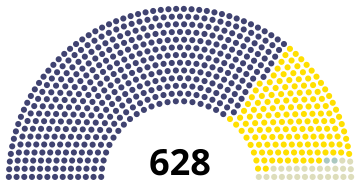 |
|---|
Parliamentary elections were held in Serbia in November 1888, [1] electing a Great National Assembly that would draft a new constitution. The result was a victory for the People's Radical Party. [2]
 |
|---|
Parliamentary elections were held in Serbia in November 1888, [1] electing a Great National Assembly that would draft a new constitution. The result was a victory for the People's Radical Party. [2]
The Parliament 628 members; 88 directly elected in 23 boroughs and 540 indirectly elected to represent rural constituencies. In rural areas voters would first elect electors, who would in turn elect the MPs. [3] Around 32,000 people were registered to vote. [1]
The People's Radical Party were largely funded by Russian backing. [4] Many of their candidates claimed that Serbia did not need an army, but should instead rely on militia. [5]
On 28 November King Milan annulled the elections held in rural seats on the basis that the elections had not been free. [3] The People's Radical Party had complained of interference by the police, whilst the Progressive Party had complained that the Radicals had conducted a violent campaign. The King ordered voting to restart on 3 December with three royal commissioners to attend each constituency. [3]
The People's Radical Party were expected to have a majority of around 40 following the original elections, but after the rural constituencies voted for a second time, the majority was increased to nearly 200. [6] The Progressive Party won several seats in the original elections, but were almost wiped out in the second vote. [7]
 | ||
|---|---|---|
| Party | Seats | |
| People's Radical Party | 450 | |
| Liberal Party | 150 | |
| Progressive Party | 2 | |
| Others | 26 | |
| Total | 628 | |
| Source: The Times [2] | ||